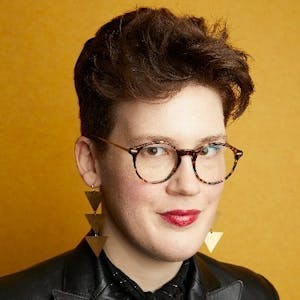But other than that, do you feel that human dependence on AI will make humanity dumber by day, and eventually AI would become a necessity for life in the future? I'm thinking kind of the Pixar movie, WALL-E, where they're that completely dependent on the robots. Look, evidently, if we're not aware of how we consume technology, we're going to become dependent on them. Like this is inevitable, right? What we can do is we need to put in some guardrails for how we consume these tools. These are tools at the end of the day, no matter how much we can externalize our problems and say everything is the fault of the tools, right? If we say that, we're never going to make any progress whatsoever, because any tool you can pick up, you can do bad things with it. It's just about how we consume it, and I think we need to raise more awareness, we need to be a bit more vigilant, we need to gradually introduce these tools to our environments, and be conscious of how we are introducing them and using them. And yeah, I don't think there's a quick shortcut for that, we just need to be aware.
No, absolutely. And it kind of, this is more of a comment than a question, but it really highlights what you said, as someone who says, as a junior deaf, they wish Copilot wouldn't tell them the answer right away, but hint the answer. Like, often a teacher would be like, you're close. I mean, just turn Copilot off for a little bit, maybe. Yeah, that's a good exercise. But also, can you tell it not to give you the answer right away? That might be an approach, prompt it to do so. For sure. We are nearly out of time, but let's just do a few more questions.
What is your take on retrieval augmented generation? Yeah, I mean, it's proliferating quite hard. Every tool that is being right now that you want to customise and sort of make it relevant to a certain environment, you're going to need to introduce RAG to it, it's a very popular and effective mechanism to make LLMs more adaptive to the environment you work in. I think a lot of companies are using it right now to customise their products on top of the foundational models. So I'm not sure there's anything controversial about it. Nice, nice. All right, so I know that Dave, we've already disconnected your computer, but where can people find you if maybe they want to get the slides or just find out more? Right, so if you Google my name, you're probably going to find some links. I'm everywhere, because I push myself everywhere. But also if you go to glitch.stream and glitch without a T. I thought that was funny. That was a good way to design my brand. It obviously was a mistake. So glitch without a T.stream, you're going to find all the links for everything I have. Awesome, awesome. And what books are you currently reading? You recommended a lot of great ones. I'm reading a book called Polymath by Ahmad Waqas. This book is about a cataloguing of all of the polymaths that are in our history, and the people who have been experts in so many different disciplines, as opposed to the common idea today that we all need to be experts in a single domain.






















Comments